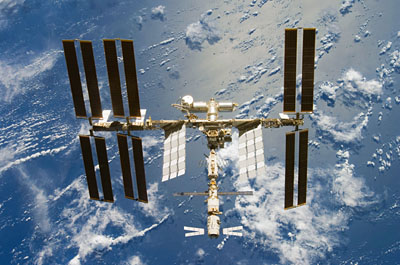One of the lectures at the biotechnology conference currently taking place in Antwerp dealt with the effect of microgravity on the space stations and shuttles on the astronauts

One of the lectures at the biomedicine conference in Antwerp dealt with microgravity (also known as zero gravity), and its medical effect on blood circulation and the heart. The lecturer tells us about ancient rockets that were designed to bring man into space. One of the least known came precisely from the Chinese people, where in the 16th century Wen-Ho invented a chair with 47 rockets under it, and ignited them all together. He hoped to reach the moon, but all he got was a huge explosion - and he was never seen again.
Our entire adult life, it turns out, is based on the fight against gravity. 50% of the muscle mass in the adult body is only intended to carry the weight of the body and resist gravity acting on it. Because it is clear that when we experience microgravity over time, the muscles will atrophy and the bones will weaken, because half of the weight has actually been removed from them. In addition, the head and neck will receive more blood, since the heart no longer has to exert itself against gravity and circulate the blood to a height of one and a half to two meters above the ground. Internal sensors in the neck and head area notice that they suddenly have more blood in their area, and receive the wrong message that there is too much blood in the body. The result is that the brain begins to work feverishly to lower the total volume of fluids in the body - up to a reduction of three kilograms from the body weight. The reduced blood volume means that the tissues receive less oxygen and food and the immune system works less well. And in short, being in space is not as simple as it sounds in science fiction books.
The best ways today to counteract physical deterioration are, in order and all together: three times a week walking for forty minutes on a track, twice a week a bicycle - thirty minutes and three times a week stress resistance exercises for thirty minutes. Given that the space station costs a good few billion dollars, it is probably the most expensive gym in existence today. It is interesting to note that although the idea of the space centrifuge, which is described endlessly in science fiction books, is possible in principle, it is mechanically very difficult. Despite this, a centrifuge with a diameter of two meters is already planned today that will spin the astronaut himself and exert force on the blood towards the legs.
When you think about the future, you realize that the journey to Mars will be more problematic, as it will require two to three years. Although the water can be recycled during the journey, a supply of solid food is necessary. There will most likely be psychological problems, among other things as a result of communication problems, to the point of a complete lack of communication with the Earth. Next year in Moscow, an experiment will begin in which six people will be imprisoned in a missile-like structure for five hundred days, and will be constantly monitored in order to understand how the confinement and the environment affect their bodies and their mood. Judging by the 'Big Brother' model, they'll go crazy long before the season is over.
Interesting spicy facts about space:
- The cosmic radiation passes through the walls of the space station and constantly harms the astronauts. Even in low orbit the astronauts described that when they close their eyes they still see flashes of light. It came mainly from the Russian cosmonauts, but no one paid attention to it because the Russian scientists were convinced that the astronauts simply stole vodka with them. After a few years it turned out that the phenomenon is the result of particles with strong energy that damage the areas of the brain responsible for vision. So... who wants to build a hotel in orbit around the globe?
- Of the total number of medications used on the space station, 70% are used to prevent seasickness, and 20% for sleep problems.

2 תגובות
Many materials are known today that insulate radiation on the various issues, the problem - as usual - is the cost...
Thickening the sides is a possible solution, for example.
Planets in other systems are a more difficult problem. I was told that the cosmic radiation in the intersystem medium is stronger than what you get inside the system.
Is it possible to filter/stop the cosmic radiation in some way?
After all, if not then it is a huge barrier to future manned journeys to distant planets.